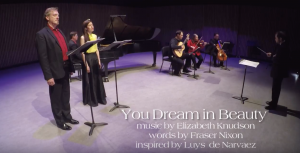text by Fraser Nixon
mezzo-soprano, tenor, acoustic guitar, piano, violin, cello
6 min.
You Dream in Beauty was selected as the winning proposal for a new piece, in a composition contest sponsored by Erato Ensemble, a Vancouver-based art song/chamber music ensemble. The piece was conceived as a modern reinterpretation of Luys de Narváez’s Cancion del Emperador, originally written for vihuela, in 1538. Its melodic material is reworked and reimagined here with an expanded instrumentation (two voices, guitar, piano, violin, and cello), and set to a poem written in villanelle form—the villanelle form being something that originated roughly around the same time as the Cancion del Emperador was composed. The poem was written specifically as text for this new piece, by Vancouver-based author Fraser Nixon.
You Dream in Beauty received its premiere by Erato Ensemble, at the Orpheum Annex, Vancouver, Canada, on May 26th, 2018.
Performed by Tim Beattie (guitar) & ensemble, at Stevenson Hall, Royal Conservatoire of Scotland, Glasgow, 6 November, 2022.
_____________
“You dream in beauty
on the western shore
knitting labyrinths
of raveled sleep
I pass in silence through
A stranger’s door
& when you rise, my love
(whom I adore)
what music will you bring
from rivers deep?
You dream in beauty
on the western shore
Here, at harvest, when
what’s sown must reap
the rich man eats his own poor brother
for god is good
& life is cheap
I pass in silence through
a stranger’s door
They who only want to take
will be forever taking more
But love is free to give
& forever ours to keep
You dream in beauty
on the western shore
Where were you—walking slipshod
on some farther western shore?
Your footsteps disappearing
in retreating oceansweep
I pass in silence
through a stranger’s door
Red suns leap over mountaintops
bright as wild lion’s roar
rains fall upon us all
darkened seas
beneath dead moons
who never weep
We dream in beauty on a stranger shore
We pass in silence through the western door…”
Fraser Nixon (1976- )
_____________
Sheet music is available through the Canadian Music Centre.
